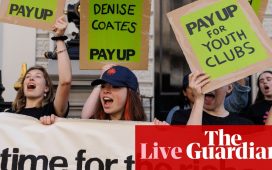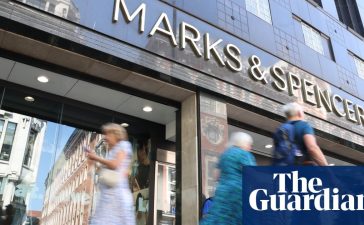UK banks open higher
European stock markets have shaken off last week’s worries, rallying at the start of trading.
The UK’s FTSE 100 index has jumped by 79 points, or 1%, to 7485, recovering most of Friday’s losses.
Bank shares are among the leading risers, with Barclays rallying 3.5%, Standard Chartered gaining 2% and NatWest and Lloyds Banking Group both up 1.8%.
Across the channel, France’s CAC 40 is up 1.3%, while Spain’s IBEX is up 1.4% and Germany’s DAX is up 1.3%.
Key events
Closing post
Time to wrap up, after a day in which some confidence returned to the markets despite the recent turmoil in the banking sector.
Here are our main stories, first on the banks:
In the transport sector:
The cost of living crisis:
And in other news:
British Airways cancels 300 flights during Heathrow staff’s Easter strikes

Gwyn Topham
British Airways is to cancel more than 300 flights to and from Heathrow over the Easter holiday period due to strikes by airport security staff.
The airline is axing about 5% of its schedule, with 16 return short-haul flights cancelled daily. It said the majority of affected customers would be booked on to alternative flights within 24 hours, or could be fully refunded.
Members of the Unite union voted to strike in a pay dispute with Heathrow, which has offered a 10% rise after years of pay freezes during Covid.
The staff on strike work in the security lanes in Terminal 5, used exclusively by British Airways, and in campus security, checking all cargo entering the airport. The strikes will take place between this Friday, 31 March, and Easter Sunday, 9 April.
European market close
The UK stock market has racked up decent gains today.
The FTSE 100 index has finished the day 0.9% higher at 7,471.77 points, a gain of 66 points today.
Markets benefitted from a modest easing in the angst in the banking sector, after last week’s selloff.
Michael Hewson of CMC Markets says:
Most sectors of the markets have seen a modest rebound, helped by events on the other side of the Atlantic as reports emerge that Citizens Bank in the US is acquiring Silicon Valley Bank’s loans and deposits.
We’re also seeing a rise in 2-year yields on both sides of the Atlantic as markets price out some of the more dire recession scenarios that were being priced at the end of last week, as markets take a breather in the wake of the turmoil seen at the end of last week.
In the crypto markets, Bitcoin has dropped 4% after the US Commodity Futures Trading Commission sued Binance founder and CEO Changpeng Zhao.
Binance is facing charges of breaching trading rules.
In a court filing in Chicago the Commission said Binance had failed to properly register with the regulator, a condition of allowing US customers to trade certain crypto assets such as derivatives. More here.
You know we’re not in normal times when banks feel the need to include nuclear attacks as a business threat.
Germany’s Commerzbank has added the danger of “a tactical nuclear attack on Frankfurt/Main”, which is Germany’s financial nerve centre and Commerzbank’s head office location, to the list of risks. in its annual report.
It now sits alongside other potential perils including the default of Germany, or another major advanced economy, the disintegration of the eurozone, or extreme cyberattacks.
Could office blocks be the next big casualty of the banking crisis?

Julia Kollewe
Higher interest rates and cuts in lending could pile pressure on commercial property sector, following the hit from hybrid working, my colleauge Julia Kollewe reports.
The new central London headquarters of the property company CBRE could easily be mistaken for a hotel, given its open lounges with comfy seating, potted plants, coffee and tech bars and library.
In the post-pandemic property world, phrases such as “hotelification” and “earning the commute” have become commonplace among executives trying to lure back workers used to working from home.
Many bosses accept hybrid working is here to stay. Some smaller businesses have abandoned permanent offices altogether.
But with higher borrowing costs, weaker levels of economic growth, and fewer people working in offices in town and city centres after the pandemic, investors fear a perfect storm is brewing in the property sector.
More here:
Boom! Shares in First Citizens have surged by 45% in early trading to $847 each, as traders hail its move to take over all the deposits and loans of Silicon Valley Bank.
US stock market opens higher as banking panic ebbs

The US stock market has opened higher, as investors are cheered by First Citizen’s acquisition of Silicon Valley Bank’s deposits and loans.
The S&P 500 index has opened up 24 points, or 0.6%, at 3,995 points, while the Dow Jones industrial average gained 253 points or 0.8% to 32,490.
First Citizens’ move to take over most of SVB, announced early this morning, is calming nerves about stresses in the banking system.
It shows that authorities in the US can move quickly to deal with the fallout from the turbulence in the banking sector, as we saw last week with Credit Suisse.
Craig Erlam, senior market analyst at OANDA, says:
It’s been a relatively calm start to the week, with investors seemingly relieved that the weekend brought no fresh turmoil in the banking sector.
That was clearly the fear going into it on Friday, with Deutsche Bank being hit particularly hard amid concerns it could be next in the firing line even if the fundamentals didn’t necessarily back that up.
Anxiety is going to remain until we have a few weeks of calm and despite the small frenzy on Friday, I think we can say that the first of those is now behind us. That isn’t to say that I think the storm has passed, just that the panic of the last few weeks may subside and allow for a more rational market to re-emerge. Or perhaps I’m being too hopeful for a Monday.
The authorities were once again hard at work over the weekend trying to clean up the mess of the last few weeks. This weekend it was a large portion of SVB that was sold to First Citizens Bank, with the FDIC retaining the remaining securities and other assets.
The concerns swirling through the banking system are causing global credit conditions to tighten, rating agency S&P Global has warned today.
The issue is particular notable in Europe.
Reuters has the details:,
One of S&P’s top sovereign analysts made the comments during a roundtable with journalists. He added that central banks raising interest rates by more than expected remained the main risk for sovereign ratings.
He also said France’s planned pension reforms that have caused social unrest over the last week looked “sensible” considering the country’s demographics and could ulimately be beneficial for its credit rating.
Deutsche Bank continues to climb back from last Friday’s lows – its shares are now up 6.25% today at €9.07.
Deutsche Bank is up 14% from the low on Friday.
No news on the way down.
No news on the way up.Markets are a bit erratic in March 2023… pic.twitter.com/jr7MvcrvR7
— Jens Nordvig 🇩🇰🇺🇸🇺🇦 (@jnordvig) March 27, 2023
Massive strike over pay in Germany hits transport

A massive strike is underway in Germany, causing disruption to mass transport and airports as unions demand pay rises to protect workers from inflation.
Trains, planes and public transit systems stood still across much of Germany today, as unions called a major one-day strike over salaries.
It’s one of the biggest walkouts in decades as Europe’s largest economy reels from soaring prices.
Union bosses warned that considerable pay hikes were a “matter of survival” for thousands of workers and management calling demands and the resulting action “completely excessive”.

The Verdi union is demanding a 10.5% wage increase. It negotiates on behalf of around 2.5 million employees in the public sector, including in public transport and at airports.
Frank Werneke, head of the Verdi labour union, told Bild am Sonntag.
“It is a matter of survival for many thousands of employees to get a considerable pay rise.”
Railway and transport union EVG, which represents around 230,000 employees at railway operator Deutsche Bahn (DBN.UL) and bus companies, is seeking a 12% raise.

Although markets are recovering today, there is still anxiety about the economic damage caused by jitters over the banking sector.
Yesterday, Minneapolis Fed President Neel Kashkari warned that the recent turmoil has brought the US closer to a recession.
In a CBS “Face The Nation” interview, Kashkari insisted that the US banking system is resilient and sound, but cautioned:
“What’s unclear for us is how much of these banking stresses are leading to a widespread credit crunch. And then that credit crunch, just as you said, would then slow down the economy.
This is something we are monitoring very, very closely.
Now, on one hand, such strains could then bring down inflation. So we have to do less work with the federal funds rate to bring the economy into balance. But right now, it’s unclear how much of an imprint these banking stresses are going to have on the economy. But it’s something to watch very carefully. And that’s what we’re focused on.
Kashkari added that Fed officials are monitoring the impact from the fallout of the banking sector “very, very closely,” and the current system has the “full support” of the Federal Reserve.
He said:
“The banking system has a strong capital position and a lot of liquidity and has the full support of the Federal Reserve and other regulators standing behind it.”
Shares of major US banks are also set to rally when the New York stock exchange opens in under two hours.
JP Morgan and Goldman Sachs are both up 1.7% in premarket trading, while Bank of America has gained 2.1%.
That’s an encouraging sign for the week ahead, as traders had been on the lookout for any other potential pockets of trouble in the global financial system.
Shares in Deutsche Bank are continuing to rally.
They’re currently up 4.65%, as financial analysts continue to give the German lender a vote of confidence after its slide at the end of last week.
“Deutsche Bank is not the ‘weak link’ in the European banking landscape,” Kepler Cheuvreux analyst Nicolas Payen wrote in a note, flagging that the lender had “very solid” fundamentals.
On Friday, JP Morgan blamed “one-way derisking trades” for the jump in the cost of insuring Deutsche Bank’s debt against default. Its analysts pointed out that Deutsche has strong capital and liquidity ratios, and was profitable last year.
Jack Ma returns to China

Jasper Jolly
The Alibaba founder, Jack Ma, has visited a school in mainland China after months during which he made no public appearances in the country because of a government crackdown on the powerful tech sector.
He is thought to have remained outside China for more than a year from late 2021 after regulators in the country tightened oversight of his businesses due to outspoken criticism from the tech entrepreneur.
Ma visited Yungu school in the eastern Chinese city of Hangzhou, where Alibaba is headquartered. A social media post contained pictures and video of Ma touring the school, which is funded by Alibaba.
The billionaire had been one of China’s most prominent business figures, but he faced a stern rebuke from China’s authoritarian rulers after criticising regulators and the banking industry shortly before the planned blockbuster stock market flotation of the fintech group Ant Financial.
China blocked the float shortly after the speech, in a move that was widely interpreted by analysts as retaliation for his comments.








